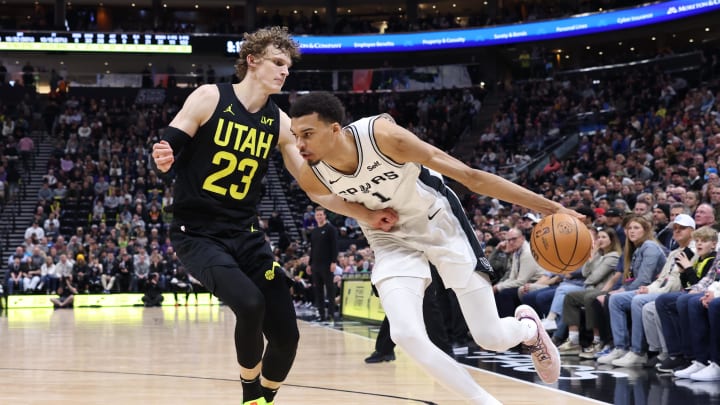
The Utah Jazz made one significant personnel move this summer, signing All-Star Lauri Markkanen to a long-term deal agreement. Aside from that, the Jazz added three more fascinating young players, continuing their youth movement.
Now that head coach Will Hardy has signed until 2026-27, here are three more questions for the Jazz this season.
Can Keyonte George emerge as Utah’s next point guard?
George made the All-Rookie Second Team in his debut NBA season, averaging 13 points, 4.4 assists, and 2.5 turnovers. That was a significant increase from his college assist totals, which were only 2.8 assists versus 2.9 turnovers in his one season at Baylor. At the same time, his three-point percentage remained at a comparable rate—33.4% in
the NBA, 33.8 percent in college, despite the NBA three-point line being farther back. George definitely has a lot of potential, but his numbers dropped near the conclusion of the season, owing in part to the Jazz starting three rookies, including Taylor Hendricks and Brice Sensabaugh. However, while George has proven to be an NBA player, Utah would like to see him prove to be an NBA point guard.
The Jazz have plenty of options on the wings, including veterans Jordan Clarkson and Collin Sexton, Sensabaugh, and No. 10 pick Cody Williams, as well as Markkanen. If George can successfully man the point and handle the offense this season, the rest of Utah’s squad may fall into place more easily.
Will Taylor Hendricks take the starting power forward job?
Hendricks was taken seven spots ahead of George in the 2023 NBA Draft, but he had a less impressive debut season. While Hendricks has potential as a three-and-D player, as evidenced by his 37.9 percent shooting from long, he lacked consistency in his first year as a pro.
The 6-foot-9 forward was defensively aggressive, recording 0.7 thefts and 0.8 blocks in just 21.4 minutes per game. Hendricks may be a raw talent, but his size and athleticism have helped him make an impact on defense. He needs to add some offensive aggression. Hendricks has a great shooting stroke, but he’s extremely passive on defense, as illustrated.
He makes extremely few trips to the foul line. Utah needs Hendricks, who won’t turn 21 until November, to stop avoiding contact. If Hendricks can substitute some of his fallaway jumpers and floaters with moves to the basket, he’ll immensely benefit this offense. When it comes to rim protection, a Hendricks-Kessler tandem has a lot of potential, but Hendricks will need to do more rim attacking.
Can the squad find a replacement for its veterans?
It appears that Utah will not compete for a playoff spot this season, therefore any veterans on the roster are trade bait. Clarkson, Sexton, and forward John Collins each have two years left on their contracts, and none of the three appear to be part of
the next Jazz contenders. Sexton can be the most tempting trading asset. He signed for $37.5 million over the next two seasons and substantially improved his passing last season, going from 2.9 assists per game to 4.9. He made around 40% from three-point range and 85.9% from the line. Advanced statistics adored Sexton. His offensive box plus/minus put him 3.8 points per 100 possessions ahead of the typical player. For a contender, he’s the ideal combo guard off the bench to generate quick offense.
Clarkson is owed slightly more than $28 million, but his shooting blew apart last season. Three years after winning Sixth Man of the Year, Clarkson isn’t delivering the same offense. If he starts the season strong, Utah may try to sell.
high. Collins’ $53 million price tag is quite high for a player who appears to be a tweener between power forward and center – not good enough defensively for center, not good enough passing for forward.
The plus for Utah and club president Danny Ainge is that they are not under any pressure to sell. Their young roster does not require salary reductions, therefore Utah will have complete control over any transaction. Getting assets for these veterans might make a significant difference when the rest of the squad matures.
Leave a Reply